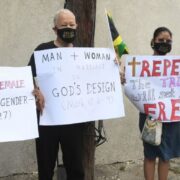Bridging Gender Digital Divide is Critical to Achieve Women’s Autonomy, Substantive Equality in region
Black Immigrant Daily News
Women’s Affairs Ministers and other government authorities, along with representatives of the United Nations, international organizations and civil society, called today for bridging the gender digital divide in Latin America and the Caribbean to achieve women’s autonomy and substantive equality in a scenario of multiple crises that require bold and transformative solutions.
They did so during the 64th Meeting of the Presiding Officers of the Regional Conference on Women, which is being held virtually this Wednesday, February 8 and Thursday, February 9, 2023.
The gathering is focused on examining the actions planned for implementing the Buenos Aires Commitment, approved last November at the XV Regional Conference on Women in Latin America and the Caribbean, and on carrying out a Special Regional Consultation Session prior to the 67th session of the Commission on the Status of Women (CSW), which has the main theme this year of “Innovation and technological change, and education in the digital age for achieving gender equality and the empowerment of all women and girls.”
The meeting was inaugurated by Jos? Manuel Salazar-Xirinachs, Executive Secretary of the Economic Commission for Latin America and the Caribbean (ECLAC); Mar?a-Noel Vaeza, Regional Director for the Americas and the Caribbean of the United Nations Entity for Gender Equality and the Empowerment of Women (UN Women); Ayel?n Mazzina, Minister for Women, Gender and Diversity of Argentina, in her capacity as Chair of the Presiding Officers of the Regional Conference on Women; and Mar?a del Carmen Squeff, Ambassador and Permanent Representative of Argentina to the United Nations and Vice-Chair designate of the Latin American and Caribbean States Group on the Bureau for the 67th session of the Commission on the Status of Women (CSW67).
In his remarks, Jos? Manuel Salazar-Xirinachs applauded the recent creation of new mechanisms for women’s advancement in the region, particularly the new Ministry of Women in Brazil, the Ministry of Women’s Affairs and Human Rights in Ecuador and the Ministry of Equality in Colombia. “This progress undoubtedly contributes to strengthening the region’s institutional framework and gender architecture and to promoting gender equality policies and the rights and autonomy of women in all their diversity,” he said.
“In light of the development crisis and the palpable gender inequality that persists in our region, we need bold solutions. Some of these solutions are in the Buenos Aires Commitment,” ECLAC’s highest authority emphasized, warning that “there is a gender digital divide that leaves women and girls out of strategic areas of education, technological innovation and labor market insertion.”
The secondary education completion rate of women is 6.1 percentage points higher than that of men in Latin America and the Caribbean. However, achievements such as these obscure unequal gender patterns by subject area. In higher education, gender gaps become evident in the fields of science, technology, engineering and mathematics (STEM).
In the majority of the region’s countries, the proportion of women graduates of STEM studies does not exceed 40%. The most critical fields are engineering, industry and construction (with female participation of 30.8% in higher education enrollment in 2019) and Information and Communication Technologies (ICTs), with women’s participation of 18% in higher education enrollment that same year.
In addition, it is estimated that 4 out of every 10 women in Latin America and the Caribbean have no connection and/or cannot afford effective connectivity (access to the Internet, availability of devices and basic skills for their use).
In the Buenos Aires Commitment, Jos? Manuel Salazar-Xirinachs recalled, the governments committed themselves to “promoting intersectoral public policies that include affirmative action to foster women’s and girls’ participation, continuation and completion of education in the spheres of science, technology, engineering and mathematics.”
Meanwhile, Mar?a-Noel Vaeza of UN Women emphasized that “the CSW67 offers an extraordinary opportunity to shape a future in which technology would contribute to transforming social norms, amplifying women’s voices, ending online harassment, impeding the perpetuation of algorithmic prejudices, strengthening women’s economic autonomy and equitably distributing the benefits of digitalization in order to achieve the Sustainable Development Goals (SDGs). It is up to us to ensure that the digital revolution contributes to women enjoying full political, economic and social equality, and to prevent it from widening preexisting gender gaps or generating new inequalities.”
Minister Ayel?n Mazzina affirmed that “the gender and diversity agenda is a priority issue for Argentina” and called for addressing digital inequalities. “We have to distribute care to create more training and labor market insertion opportunities for women and diverse identities, so more women can work in dynamic sectors, such as science and technology. It is necessary to break with the stereotypes that make girls believe they’re not good at learning math or hard sciences. We have to strengthen the foundations of a more egalitarian society and get gender-based violence out of homes, out of politics, out of Twitter and all digital spaces,” she declared.
Ambassador Mar?a del Carmen Squeff agreed that “ICTs offer a vast quantity of benefits, as we were able to appreciate during the COVID-19 pandemic, but it is also a space in which gender inequalities are reproduced and amplified.” “Our countries have extensive experience in defending women’s rights on the international stage, which have been enshrined in the various documents adopted at the regional conferences on women in Latin America and the Caribbean,” the representative highlighted, expressing the Argentine mission’s full willingness to collaborate and ensure that the CSW67 be successful for the region.
On the first day of this meeting, Ana G?ezmes, Director of ECLAC’s Division for Gender Affairs, and Cecilia Alemany, UN Women’s Deputy Regional Director for the Americas and the Caribbean and ad interim Representative in Argentina, presented the reference document entitled Gender equality and women’s and girls’ autonomy in the digital era: contributions of education and digital transformation in Latin America and the Caribbean, prepared by ECLAC, UN Women, and the United Nations Educational, Scientific and Cultural Organization (UNESCO).
According to this report, in order to advance towards women’s autonomy in the digital era, it is necessary to incorporate the gender perspective into the transformation of the productive matrix and the digital transformation of dynamic sectors of the economy. It is also necessary to design comprehensive universal care systems that promote greater digital inclusion of women; reduce digital gender gaps to enhance the autonomy and participation of women; and promote digital trust and security for women and girls.
It also urges for promoting the transformation of education for an inclusive recovery and to improve the situation of girls and women, especially in STEM areas; guaranteeing digital labor rights for women; and strengthening governance and multisectoral alliances and reaffirming social pacts to ensure compliance with the SDGs. Furthermore, it is essential to produce information to make the situation of women in all their diversity visible in the context of innovation and digital transformation processes.
The 64th Meeting of the Presiding Officers of the Regional Conference on Women is organized by ECLAC, as the Conference’s Secretariat, in coordination with UN Women. Participating in the gathering are delegates from the 15 countries that make up the Presiding Officers (Argentina, Barbados, Bolivia, Chile, Colombia, Costa Rica, Cuba, the Dominican Republic, Ecuador, Honduras, Mexico, Peru, Saint Vincent and the Grenadines, Uruguay and Venezuela), along with other Member States and associate members of ECLAC and representatives of the United Nations System, intergovernmental organizations and civil society.
Donate At Caribbean News Service, we do not charge for our content and we want to keep it that way. We are seeking support from individuals and organisations so we can continue our work & develop CNS further.
NewsAmericasNow.com









Leave a Reply
Want to join the discussion?Feel free to contribute!